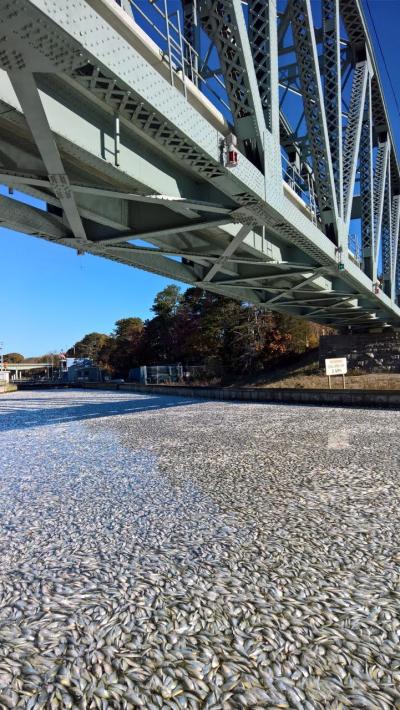Massive Fish Kill Clogs Shinnecock Canal

Tens of thousands of menhaden, also known as bunker, died in the Shinnecock Canal on Monday, and a cleanup effort is underway.
While state officials were still investigating the cause early Monday afternoon, water quality experts said that the fish likely died as a result of near-zero oxygen conditions in the canal overnight caused by predatory fish pushing them north, and not an algae bloom from high levels of nitrogen, as has been the case in other local fish kills in recent years.
"I think it's kind of just wrong place, wrong time," said Sean O'Neill, the Peconic Baykeeper, who was among those who went to survey the wall-to-wall fish choking the canal Monday morning. His organization sent a sample for a water quality test from the north end of the canal to Stony Brook University's marine science lab. Though the results will take a few days, both he and Christopher Gobler, who heads the marine science program at the university, believe water quality is not to blame in this case.
"The water is crystal clear right now. There doesn't seem to be an algae problem in that area right now," Mr. O'Neill said, calling the die-off a result of a confluence of events as the fish migrated south.
The State Department of Environmental Conservation did not immediately find any pollutants in the area.
Dr. Gobler pointed out that on Sunday "there were very dense schools of menhaden right up against the shore . . . pinned into shore by predators, striped bass and bluefish and even things like whales, believe it or not. It's possible that they're even chased up into the canal by some of these predatory fish."
At sunset, a large school of bunker was reported in the canal. The "giant tide from the supermoon" was another factor, Mr. O'Neill said.
As the tide turned, the locks closed, and when that happens the water in the canal no longer flows freely between Shinnecock Bay and the Peconic Estuary. Oxygen levels drop in stagnant water, and when the sun goes down and photosynthesis stops, the oxygen levels further decrease, Dr. Gobler said.
"With lots of fish in there, they're caught. They're also consuming oxygen. Oxygen levels dropped probably near zero. They don't live too long under those sorts of conditions," he said.
When the locks reopened at 9:30 Monday morning, the dead fish were flushed out, and some that were still alive swam through the canal, Dr. Gobler said. Many have also washed up dead in back eddies and near marinas.
The Southampton Town Trustees and the town's bay constable are trying to coordinate an effort with local commercial fishermen to harvest as many of the bunker as they can, and a cleanup is being mobilized to prevent the fish from stinking up the shore.
"It's the sheer number of fish -- I don't know think we're going to avoid the nuisance completely," Mr. O'Neill said. "It's definitely a little weird to happen at this time of year," when water quality is usually high.
But, the population of menhaden has grown intensely in recent years, the experts said -- good news for the fishery, but larger schools have led to more frequent fish kills.
In late spring of 2015, bunker died in two large fish kills the Peconic Bay, west of the canal, between the Peconic River in Riverhead and Reeves Bay in Flanders, an area that has chronically low-dissolved oxygen and increased nitrogen pollution. Dr. Gobler estimated that nearly 400,000 bunker fish died. The professor, who researches Long Island's coastal waters, said the cause was low oxygen from a dense algae bloom in the region.
"We need to do the best job possible at minimizing low oxygen in our waters," Dr. Gobler said. There are plenty of other areas, including in the Town of East Hampton, such as the back of Three Mile Harbor, that experience very low levels of oxygen at night, particularly during the summer. "There are dozens of examples," he said.
However, the fish kill Monday morning was simply an unfortunate set of circumstances. "To me, it seems pretty cut and dry," he said. "Once those locks shut, those oxygen levels just start dropping. It doesn't seem very fishy, if you will."
